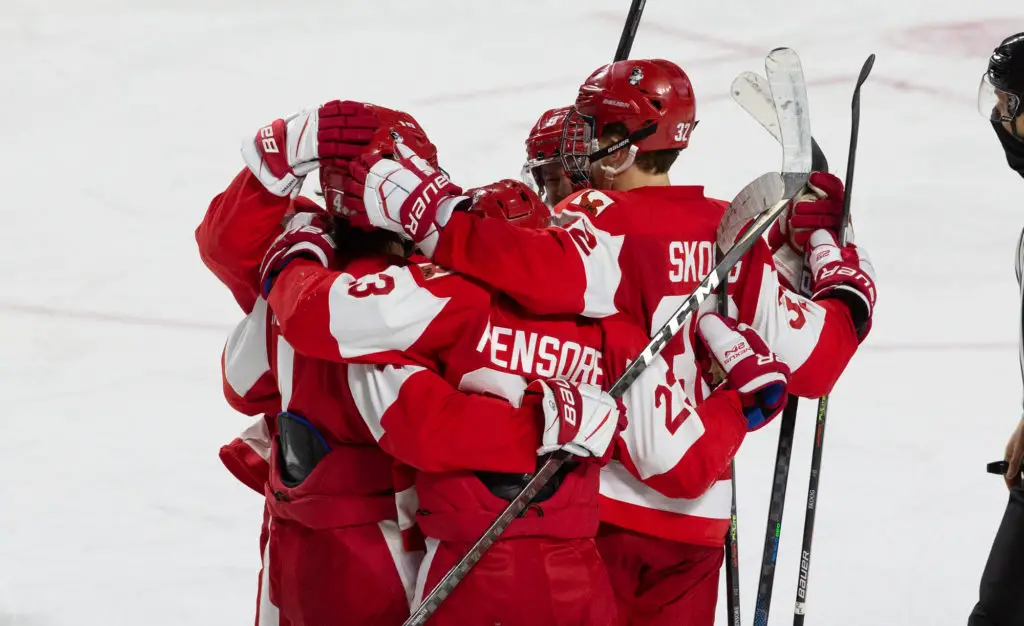
As we approach the end of this strange pandemic season, I need to put aside something I’ve said publicly a number of times and speak up on a topic that bothers me.
Multiple times this season, I’ve said that I won’t criticize decisions that have been made. Whether it be a delayed start date for all six leagues, the decision of 10 college hockey teams not to participate this season, Hockey East’s decision to pivot on how games are counted or scheduled, or even the decision to make the postseason tournament a single-elimination event.
Whether I agree or disagree with any of these decisions, I understand this is a difficult season and a lot of thought was put into each of them.
But the time has come that I can’t hold my tongue. I am highly disappointed that the athletic directors in Hockey East decided NOT to crown a regular-season champion in both men’s and women’s leagues.
Listen, I understand that stops and starts have caused an imbalance in schedules among teams in both leagues. And quite possibly frustration had boiled over and too many people wanted to completely devalue the regular season.
In my opinion, and I emphasize that this is my opinion, in a season like this where players have had to endure such incredible circumstances – stops and starts, isolation and quarantine, constant testing, all of which doesn’t take into account players who have tested positive for the coronavirus – all of these are reasons that whichever team is deemed the best at the end of this grueling season deserves to be crowned a champion more than ever.
I’ve talked to a number of people throughout the league about this since it became revealed last Wednesday that neither the women’s nor men’s league would be crowning a champion. From everything I can learn, one of the underlying issues related to this is petty.
Multiple people told me that there was a concern that Boston University might win the men’s championship. The reasoning, it’s somewhat complicated.
Boston University was the final of the 51 programs to get underway. The Terriers planned to play early in December and were hit with COVID that impacted enough players that games had to be postponed. After their players went home for the holiday break, there needed to be a 14-day quarantine period upon their return. Extreme? In this environment, no. But enough were seemingly bothered.
Once they did finally get on the ice, BU performed well and at one point stood at 7-2-0 and, at least for a day, was atop the Hockey East Power Index, a formula created by the league in an attempt to balance schedules and results to determine a fair and equitable final standings.
That, according to multiple people, began the conversation that maybe it wouldn’t be fair to have Boston University win the regular-season championship, and thus the trophy shouldn’t be awarded this year. Once it came to a vote of the athletic directors, it was decided there would be only one champion – a postseason champion – and it would impact both the men’s and women’s side.
All this said, it might seem like such a charge would be led by Boston College, BU’s crosstown rival. Information says otherwise that BC, despite likely being the team robbed of this championship, had nothing to do with this. Sources say BC didn’t oppose canceling the regular season championship, but also didn’t seem moved otherwise, knowing their team was in a strong position to win the title.
All that said, let’s come back to the men’s league in a second. Let’s look at making that decision on the women’s side.
I don’t cover women’s hockey and don’t purport to do so, but I follow it enough, particularly in Hockey East, to understand that this year’s Northeastern women’s team is among the best this league has had. At 17-1-1, the Huskies are No. 1 in the nation in the USCHO.com poll and basically dominated the league. If any team in men’s or women’s hockey deserves a trophy for their regular-season performance, it’s Northeastern’s women.
On the men’s side, I guess I don’t personally see a reason to simply cancel the regular-season champion, no matter which team is on top at the end. Looking at the numbers today, with Boston College holding a 1.86 advantage in points in the Hockey East Power Index and BU facing only UMass Lowell this weekend after a scheduled game against New Hampshire was canceled, it will be difficult to catch the Eagles.
Boy, that seems to make this whole argument against BU more than petty.
We are now left to crown only a postseason champion in Hockey East. And do so not knowing if a sudden COVID outbreak could easily eliminate a team from the tournament. There is no leeway in the postseason – if you can’t play, you can’t postpone. You can’t simply take the healthy teams and schedule games hoping that those with COVID “catch up” at some point in the tournament.
You get COVID at this time of year, your season is likely done.
One other important item in this whole dilemma is the league itself. First-year commissioner Steve Metcalf has worked hard all season to make sure this season – regular and postseason – is completed. His office had every intention of handing out two trophies – regular and postseason – to each league. And while I’m sure Metcalf was a part of the discussions, ultimately decisions like this lie above his head.
The athletic directors at all 12 Hockey East institutions (11 men’s plus Holy Cross on the women’s side) have the power. The commissioner simply carries out their desires.
Sadly, this desire – and the ultimate decision – likely failed the student-athletes.
Providence in familiar place: the bubble
The NCAA tournament bubble this time of year is the most uncomfortable place for a coach.
Not knowing if you’re in or out of the NCAA field based on the result of a single game and any given night makes things feel rather tumultuous. This season, with the inability to quantify your position through the PairWise Rankings, understanding that there will be subjectivity added to a typically objective process adds to the associated anxiety.
For Providence and coach Nate Leaman, though, the bubble feels very familiar.
In 2015, his Friars were the last team into the NCAA tournament and went on to win the national championship. Two seasons ago, after an exit in the Hockey East quarterfinals, the Friars learned their NCAA fate only late in the postseason league tournaments. That team advanced to the Frozen Four before ultimately falling to eventual national champion Minnesota Duluth.
Just because the bubble is a familiar place, it doesn’t mean it’s comfortable.
“We’re definitely in the bubble area,” said Leaman. “The way I felt after the game on Sunday [a come-from-behind 3-3 tie against Northeastern], I felt like we’re coming. But I went home and it dawned on me that we don’t have 10 games left. We have one.”
That realization underscores that the delays in starting this season have thrown off timelines that typically a coach might rely on in a typical season. Leaman admits that it is rare for a team to click and play their best hockey from day one. There is a process that usually takes Leaman’s clubs until early in the second half of the season to begin playing their best hockey.
That’s been the case again this year, but this year, instead of feeling comfortable in his team’s play in early January, the delayed start pushed that to late in the regular season.
“Normally, this is when the Friars teams start to come,” Leaman said. “Our team has battled through it all season. We’re on a really good run in the second half here. The UMass game [an 8-1 loss] after having been on a pause [for COVID], was a setback. Now we’ve got to get on a run.
“I was happy with our play against Northeastern [taking four of six points]. We had to get results.”
Playoffs are coming
For those who may have missed it, here is the format and the dates for the Hockey East playoffs, which begin next Wednesday. All games will be played at campus sites.
Opening round, Wednesday, March 10: seeds 6 through 11 play single-elimination games at the higher seed
Quarterfinal round, Sunday, March 14: top five seeds and three opening round winners play a single-elimination games at higher seed; teams are reseeded after opening round
Semifinal round, Wednesday, March 17: four remaining team play single-elimination games at higher seed; teams are reseeded after quarterfinal round
Championship, Saturday, March 20: higher remaining seed will host lower seed in single game championship


